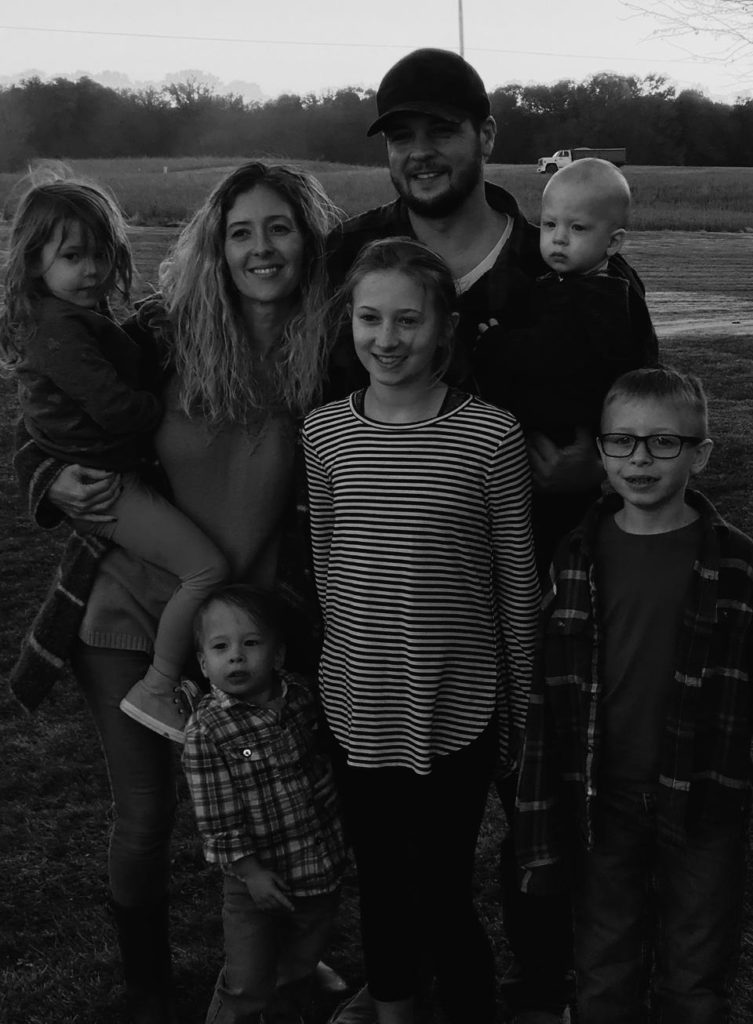Eating out often isn’t much of an option for Andy and his family. With a wife and five kids, a trip to McDonald’s costs him well over $30, he said. A sit-down affair will leave him with a check of $80 or more.
It’s a cost he and his wife, Megan, are willing to forego in an effort to keep expenses between $35,000 and $40,000 a year.
“We eat at the dinner table together,” said Andy, who wished to remain anonymous since he’s still working full-time. “It’s not only a financially good thing to do, but good for the family.”

Andy and Megan keep costs low, even with five children, in an effort to reach retirement by the time … [+] Andy turns 45.
Black Sheep Millionaire
For Andy, the benefits of eating in far outweigh the costs. But it’s not just the expense of the food bill that he has in mind. Instead, it’s his goal to reach financial independence, or to have enough money in the bank to ensure that he never has to work again, unless he wants to. He’s a part of the financial independence, retire early (FIRE) movement, seeking to super-save his way to retirement. But he doesn’t have a rocking chair on the stoop mindset, nor a minimalist disposition. Instead, he’s seeking FIRE to ensure the option remains available to him, even on a one-person income of $60,000 supporting a family of seven.
With a fully paid off home, he says he’s nearly financially independent, if the family were to cut costs to about $26,000. He wants his retirement life to feel a little more comfortable than that, and he believes he will retire – beyond some side projects – by the time he reaches 45, just seven years from now.
But with the youngest kid still 16 years away from going to college, his goals include ensuring there’s enough safety-net, no matter what unexpected expenses are thrown his way.
Learning To Budget
In his twenties, Andy took a role at a startup in the Nashville, TN area, where he currently resides. At the time, married, with no children, he would max out his retirement account to take advantage of the tax savings and then spend every extra dollar he had. It would go towards vacations and his truck, along with food, his college education and charity.
But after a divorce and meeting Megan, that all changed. She was very frugal herself, and had two children from a previous relationship. Around that time, he had also heard about the FIRE movement from Mr. Money Mustache, along with other sources, and realized the mindset fit with his personality. After a conversation with Megan, they realized they “don’t need a lot.”
In order to get the spending down, though, he needed to understand the budget. It clicked for him when he came across the ‘spend what you earn’ strategy of budgeting. Using tools, like You Need A Budget, he and his wife discuss what they can spend on certain parts of their life. There’s a budget for food, a separate item item for home décor or the cars or clothes.
Nothing gets distributed until you receive the paycheck, then “you’re deciding how am I spending that money,” said Andy.
This has given the family the ability to keep costs low, even with five kids, while ensuring they still “have pictures on the wall,” avoiding a minimalist lifestyle, Andy added.
Home Downgrade Proves To Be An Upgrade
Andy has always tried to pay off his mortgage quickly. While it’s a debate whether you should pay off the home – since the loan typically has a low interest rate – or invest the money, Andy believes it’s beneficial to remove the largest expense from your life.

Early in their relationship, Andy and Megan came to the realization that they didn’t need a lot to … [+] be happy. They adjusted their spending to match their new goals.
Black Sheep Millioinaire
“Once your housing expenses are knocked out, it’s not very difficult to find a way to earn enough to cover the rest of your expenses,” said Andy, who details his strategies at Black Sheep Millionaire.
He has used some strategies to pay off a home quickly, leaving him with only minimal yearly tax costs. The most interesting situation occurred in the purchase of his current house.
The family lives in what they would consider close to their “dream home.” But they came across the house serendipitously.
Prior to moving, they owned a smaller house for $175,000 in an area that wasn’t as desirable. A few years later, they found a piece of land that had acres of space, which they adored, buying it for $119,000, including an $80,000 mortgage.
They decided they wanted to build their dream home on the land. As they began the process of getting quotes for the new home, they discovered a similar property a few miles away that already had a home on it, which nearly matched their description of the house they were building.
Instead of building the dream home, they bought this near-dream home with a $385,000 mortgage. By going this route, they were able to save a minimum of $150,000 from the new-build plans.
Once they sold the previous home in the less desirable area of town and the land, it all went towards the mortgage, allowing them to pay off the new loan five months after signing the deed.
Hitting Pause On Saving
Andy’s family lives on his one income of $60,000 a year. He works for an education technology startup, and it doesn’t currently offer a 401k. It’s the first time he hasn’t contributed to a retirement account since he began saving in his 20s.
“I wouldn’t really recommend that anyone who has not achieved FI [or extremely close] not contribute,” Andy said.
Now, because his current company doesn’t offer the 401k – he does have stock options in the firm – and his family relies on his income, he has stopped saving. Even still, he might max out the family’s IRAs, but he’s waiting to see his tax bill for 2019 first. He expects to return to saving in 2020.
If his family spends about $40,000 a year, then his retirement number would fall somewhere near $1 million, assuming he’s multiplying expenses by 25. It’s the common tactic that those in the FIRE community use to estimate their retirement number based on a 4% withdrawal rate.
For Andy and his family, though, the $40,000 a year mark would put them closer to “Fat FIRE,” or the term the community uses for those that live extremely well in retirement. He says they could cut expenses to $26,000 tomorrow and he could retire.
When calculating his financial independence number, Andy adds the home equity into the equation, accounting for 30% of his portfolio since if he sold it, the “sum would generate enough of a return to provide for our living expenses,” he said. When accounting for his retirement number, he does not include the home.
By saving for a mark higher than he needs to spend, he’s creating wiggle room.
It’s not just to protect his children, but also to build a legacy, which he hopes to do by the time he retires, whether that’s at 45, 55 or beyond.





